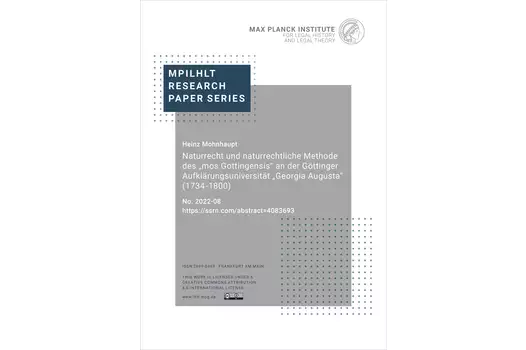TABLE OF CONTENTS
Heinz Mohnhaupt (Max Planck Institute for Legal History and Legal Theory), Naturrecht und naturrechtliche Methode des „mos Gottingensis“ an der Göttinger Aufklärungsuniversität „Georgia Augusta“ (1734-1800) / Natural law and the natural law method of the "mos Gottingensis" at the University of the Enlightenment "Georgia Augusta“ (1734-1800)
- Enlightenment and natural law are mutable concepts. In the founding goals of the Göttingen University "Georgia Augusta", founded in 1734, they are concretely combined to form a utilitarian model of science for all disciplines. Science should be useful and experienceable for state and society. For the system of "Jurisprudentia" this implies an encyclopedically based order of material, which on the one hand is oriented towards pedagogical teaching of the subject matter and on the other hand towards practical exercises. This style of teaching represents the very successful "mos Gottingensis" in the 18th century.
- This article describes the doctrine concerning the canonical penalties known as censures. There are basically three different types of punishment for crimes committed in the context of the ecclesiastical jurisdiction: excommunication (excommunicatio), suspension (suspensio) and interdict (interdictio). After experiencing an important boom during the Late Middle Ages - in part due to the religious-political situation of the period -, the doctrine on censures was widely systematized and commented on by theologians and jurists during the Early Modern Period. In the course of this process, and as a result of the colonial expansion in America, numerous writers dealt with its application in the Spanish American territories. In particular, controversies arose related to the use of excommunications in the numerous confrontations between civil and religious authorities, as well as in interactions with indigenous people, the activities of the Holy Office of the Inquisition, and, of course, the implementation of regulations issued by the Council of Trent.
Jesús Joel Peña Espinosa (INAH), Traslado y renuncia de prelados / Transfer and resignation of an ecclesiastical prelate (DCH)
- This article studies the juridical bases on which Spanish American ecclesiastics (bishops and parish priests) were able to exercise their capacity to renounce a benefice or to be transferred from one bishopric or parish to another. The spiritual and jurisdictional rights and obligations of the clergy to hold a benefice were regulated by canonical and civil legislation for Spanish America; beyond these norms, we have consulted the theological basis that gives meaning to the relationship between subject and benefice. The two acts, renunciation and transfer, are analyzed in order to elaborate the characteristics and conditions of each one with respect to the historical context of the Hispanic world in its overseas territories, according to the particularities of the law in its most important sources.
ABOUT THE JOURNAL
Since its foundation in 1964, the Max Planck Institute for Legal History & Legal Theory has been dedicated to basic research from a historical perspective in the field of law. A particular challenge embraced by the Institute is to create historical and empirical bases for a critical study of the system of law in a globalized world. To this end, the Institute is paying increasing attention to the interrelationships between European and non-European legal systems. Papers in this series cover topics of the Institute's focus areas. To have your paper included in this series please contact the series editor at ssrn@lhlt.mpg.de
More information can be found here.


No comments:
Post a Comment